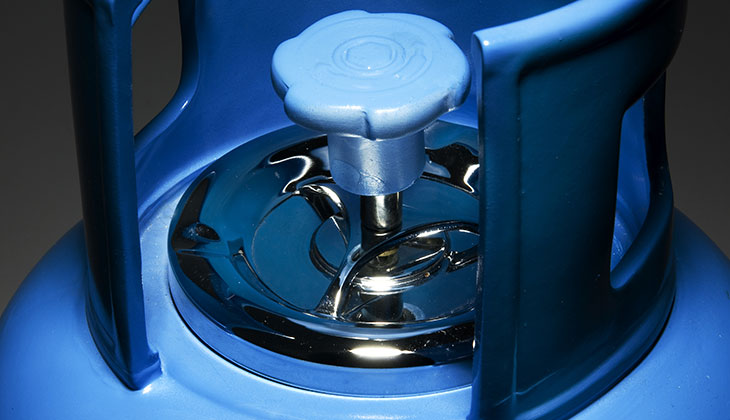All about bottled gas and caravans
Chris Hogan, 10th May 2015, Caravan
Whether you have a static or touring caravan the chances are your cooking and heating, if you have it, is likely to be by bottled gas and our lives could be a lot more miserable - particularly in the UK climate - without it.

But stuffing liquefied propane gas (LPG) into a metal canister under pressure and holding it there while it expends all its energy trying to get out, presents a lot of problems. Although modern gas equipment is designed to solve those problems safely it is vital to keep everything in good condition and know how to use it properly.
Gas types
There are two types of LPG, butane and propane. Often you'll find butane in blue cylinders and propane in red but that's not necessarily the case so it makes sense to check.
Butane has a higher boiling point and is harder to use at anything below five degrees (centigrade). This means it's fine for most of the spring, summer and autumn but for year-round use propane is better.
Regulators and hoses
The job of the regulator is to make sure that the gas in the cylinder is only delivered to your cooker, heater or barbecue at the right pressure - significantly lower than the pressure in the cylinder. Regulators are usually painted the same colours as their cylinders - blue for butane and red for propane - but again this cannot be relied on 100% so you need to check that you're using the right one.
Two types of hose are used. One is used for the high pressure gas between the cylinder and the regulator and another on the low pressure side between the regulator and your appliance. LPG causes hoses to become brittle over time so they should be replaced regularly - the recommended intervals are five years for orange high pressure hoses and two years for the black low pressure ones. The manufacturing date should be printed on the hoses.
Changeover valves
These allow two cylinders to be connected to one appliance and, as their name suggests, will allow you to change over safely from one cylinder to another. When one cylinder runs out you can carry on with the second one until you get a chance to refill the empty one.
There are manual and automatic changeover valves but if you have an automatic one make sure you check it every now and then. If you don't notice that it's switched over you might have both cylinders run out on you!
Safety concerns
LPG is heavier than air which explains why gas lockers have ventilation holes at the bottom, not the top, and these should never be blocked off. Cylinders should be kept upright at all times so use the anchoring system in your locker. If gas does escape, perhaps while you're changing bottles over, close all valves and stand back until you are certain the gas has dispersed.
When travelling it makes sense to shut the valves off completely. Ferries and Eurotunnel won't allow you to travel unless the valves are shut in any case.
Carbon monoxide
Exposure to this deadly gas is fortunately a well-known hazard with LPG but accidents do still occur. For the last few years the law has required CO detectors to be fitted to new caravans but they are very easy to fit to older ones. Make sure all vents in your caravan are unblocked too.
Portable refillable gas bottles
Usually empty gas bottles are exchanged for full ones at gas suppliers but with the growing availability of LPG at petrol stations as a fuel for vehicles (known as Autogas), it wasn't long before people started bringing out LPG canisters that could be filled at these pumps.
The early versions were so dangerous that the Health and Safety Executive (HSE) issued a directive to ban them in 2010. Now two suppliers of safely refillable cylinders are saying that their cylinders can be refilled at petrol stations. They are Safefill, with portable cylinders, and Gaslow, whose cylinders are permanently installed but can be filled while the 'van is at an Autogas petrol station, as long as they have the correct adapter.
Both these can provide a list of stations and other places where you should be able to refill their cylinders but you may still encounter difficulties as it takes time for the message and training to percolate through the system.
Keep warm and safe
There's no doubt that portable gas is incredibly handy and great to have around for caravans but safety must be kept in mind.
We wish all our caravanners a happy and accident-free season.